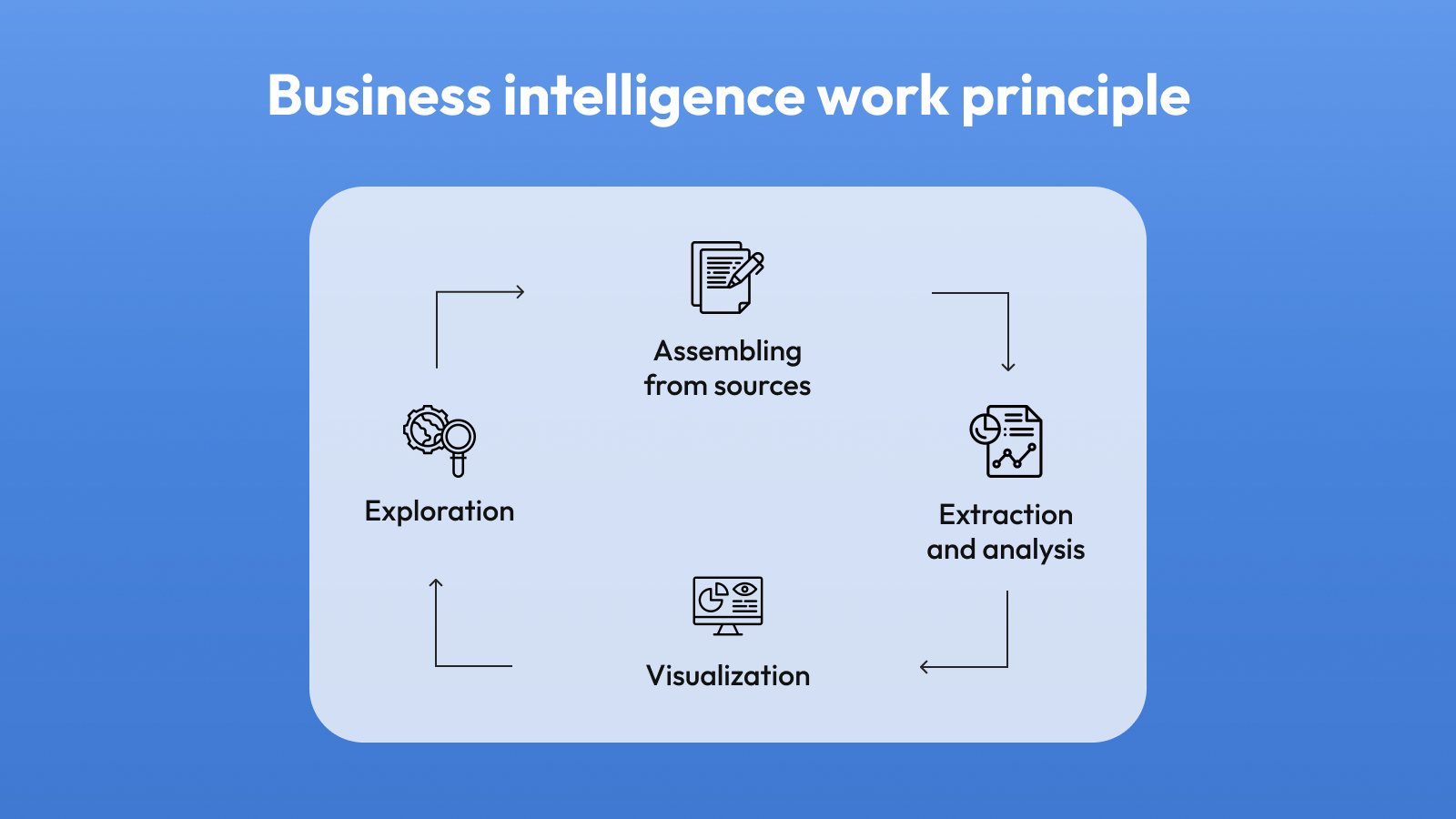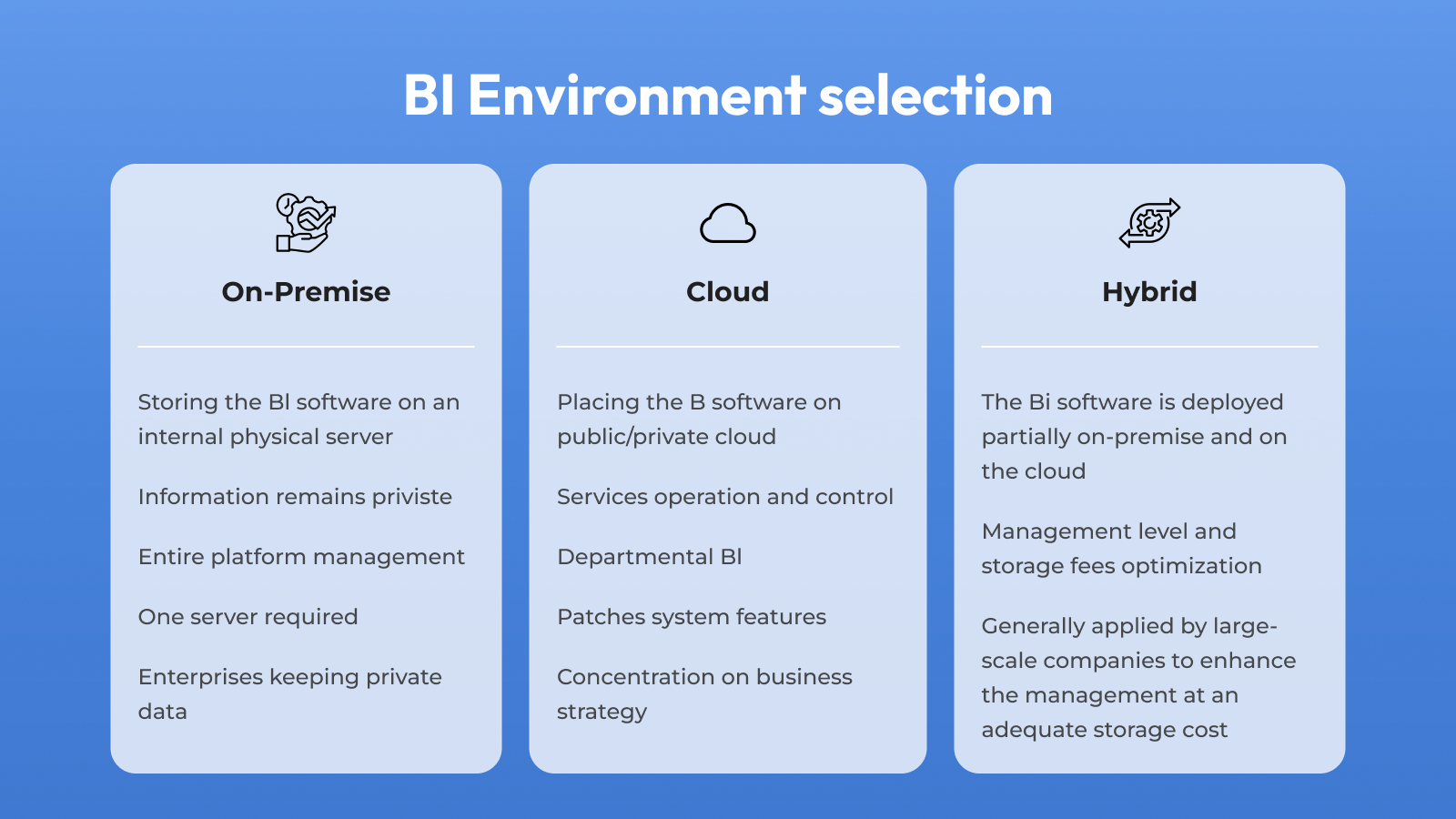The importance of utilizing data and analytics to aid decision-making has risen with the growth of businesses. BI is a valuable tool for organizations, as it provides insights into their data to aid in informed decision-making. It is expected that the implementation of Business Intelligence in 2023 will gain significant success due to advancements in technology.
This article outlines the potential benefits for organizations through the implementation of BI in 2023. Start reading it to learn more about BI integrational fundamentals!
Business Intelligence (BI) is a valuable resource for businesses capable of gathering and analyzing data that relates to the performance of a business. This data can be used to make more informed decisions that affect the growth and success of the organization.
Basically, BI tools collect and transform raw data into useful information. This can include reports on current business operations, looking at past events to gain insight about what might happen in the future, identifying trends with predictive analytics or making predictions based on past patterns with prescriptive analytics.

How BI works: core operating principle
The main purpose of BI technology is to give companies the ability to make effective decisions based on data-driven facts instead of relying on guesswork or intuition alone. It helps provide clear rationales for why certain strategic changes should be made and how those changes could positively impact businesses operations and profits.
Business intelligence plays a vital role in making well-informed decisions. Accessing operational data can be challenging due to its complexity and volume, but it holds significant value. Business intelligence systems utilize analytics and visualization tools to enhance data accessibility and comprehensibility. Analysts are able to identify trends and strategies through analysis.
Moreover, BI is utilized by businesses to analyze data and make informed decisions, resulting in trend prediction and loss prevention. It gives information about customers, inventory, and competition. Knowing markets helps businesses find success. BI systems boost efficiency, profit, and predict market shifts.
Business Intelligence is crucial for companies of all sizes. It provides valuable analytics and statistics for informed decision-making, improving organizational performance by allocating resources effectively and addressing weaknesses.
Are you ready to implement Business Intelligence (BI)? Let's look at the steps you must follow for a successful implementation.
Step 1. Creating a roadmap for BI implementation that clearly defines your goals and identifies key performance indicators (KPIs) to track progress. This step also requires documenting your requirements, such as data visualization tools, reporting capabilities, predictive analytics, and custom queries.

Thinking out BI implementation: what environment to choose
Step 2. Selecting the right BI software that suits your industry and goals. This involves listing features, aims, and specifications to evaluate options. A free trial can help ensure the software meets your requirements. After selecting the suitable BI solution, end-users should receive proper training.
Step 3. BI implementation process. Accuracy and responsibility in previous data selection and preparation phases are essential for a smooth process. Relevant data must be analyzed and processed with coherence, precision, up-to-date information, and value.
Step 4. Maximizing profits through BI. This involves utilizing BI software to collect and analyze data, create visual representations, and use the findings to improve business operations, refine business strategy, and allocate resources and investments effectively. After achieving your initial objectives, you can establish new ones and devise methods and approaches to accomplish them through business intelligence.
In order to successfully implement Business Intelligence into your working processes, you can apply to an experienced software development vendor. They will consult you on how to hire app developers, offer you such a team of skilled professionals, and help you start using BI as soon as possible for your success.
The cost of a business intelligence (BI) project depends on the company's specific needs and system complexity. There is no set base number; however, software license fees and other regular fees are not included in this cost and are separate expenses paid periodically by the company.
When budgeting for a BI implementation project, it is important to consider factors that impact the cost, such as the quantity and variety of data sources integrated into the system, including ERP, CRM, and HR, as well as the volume of data that needs to be stored. These considerations can help ensure a successful rollout of reporting and dashboards.
The integration of business intelligence (BI) in 2023 can provide opportunities for data-driven decision-making. To remain competitive, organizations need to utilize their data to enhance their services and gain an advantage in the market. With a structured plan and effective tactics, it is possible for organizations to successfully incorporate BI by 2023.
If you want to integrate BI into your company workflows, the skilled software development company can help you. The IT professionals will assist you in a successful solving all the tech issues connected to such an integration.
Yuliya Melnik is a technical writer at Cleveroad. It is a web and mobile app development company in Ukraine. She is passionate about innovative technologies that make the world a better place and loves creating content that evokes vivid emotions.